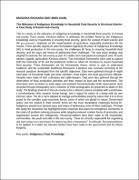| dc.description.abstract | MUGISHA RICHARD (2007-M093-10108)
The Relevance of Indigenous Knowledge in Household Food Security in Kiruhura District: A Case Study of Kanoni Sub-County
This is a study on the relevance of indigenous knowledge in household food security in Kanoni sub-county, Kazo county, Kiruhura district. It addresses the problem faced by the indigenous knowledge used by households in ensuring food security, given the context of land scarcity and the government’s emphasis on the modernisation of agriculture, especially production for the market. Three specific objectives were formulated regarding the place of Indigenous Knowledge (IK) in food production in the sub-county; the challenges IK faces in ensuring household food security; and the ways and means of addressing these challenges. The case study strategy was adopted to examine the sub-county as part of a wider semi-arid pastoral ecological zone of south western Uganda, particularly Kiruhura district. Two theoretical frameworks were used to capture both the historicity of IK and the livelihood context in which IK functions to ensure household food security. These frameworks are the hermeneutic theory, which is used to understand traditions, and the sustainable livelihood framework. Literature was reviewed according to the research questions developed from the specific objectives. Data were gathered through in-depth interviews of household heads and other members, food traders and local government officials. Samples were made of both cultivators and cattle-keepers. Data were also gathered through the observation of food production activities and their impact on land and the environment. The interviews were recorded on audio tapes and analysed hermeneutically while observations were recorded through photography and a selection of these photographs are presented as plates in this study. The findings show IK in the sub-county to be a coherent science complete with a worldview, a communitarian ethic towards human beings, and a regard for nature as a being with its own intrinsic value. The IK is more adapted to manage vulnerabilities posed by nature than it is to those posed by the complex socio-economic forces, some of which are global in nature. Government policy and the market in their present forms are the most devastating challenges facing IK. Indigenous people have devised ways and means of addressing some of these challenges. Through this study the researcher has highlighted those responses that place the endogenous worldview at the centre of problem-solving processes while adapting relevant modern forms of production and organisation around this endogeneity. Recommendations have been made to the households, communities, the youth and elite in the sub-county. These are directly responsible for organising and innovating ways and means for improving their communities‟ livelihoods. Recommendations to be applied in a wider but relevant context have been made to the government and the Nkore kingship.
Key words: Indigenous, Food, Knowledge | en_US |


